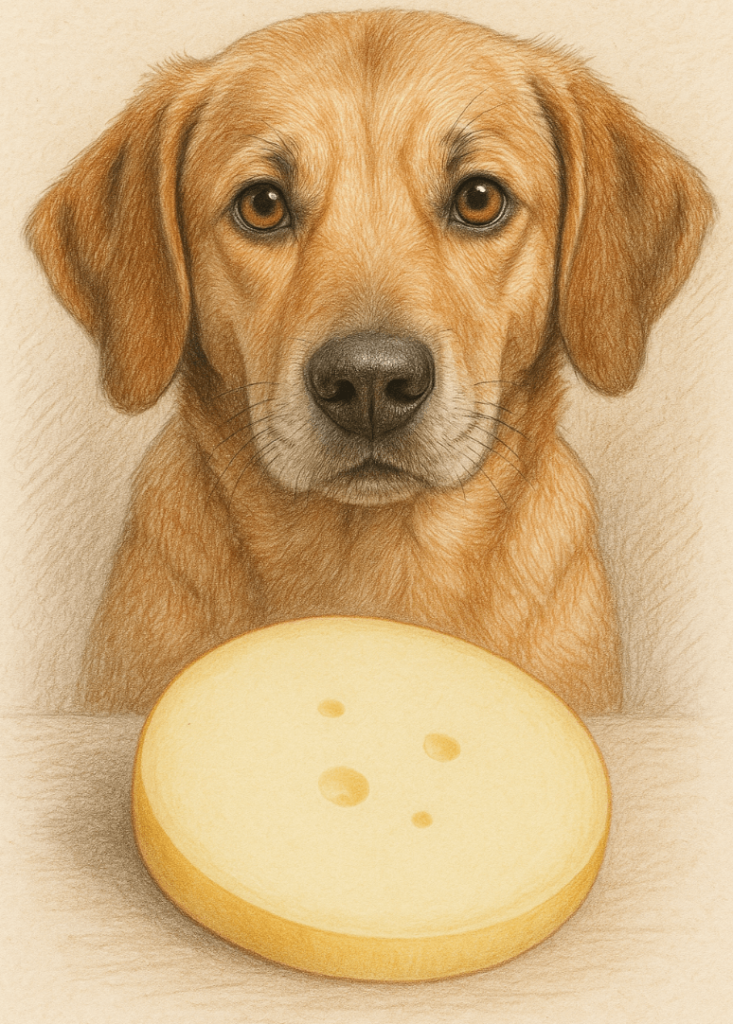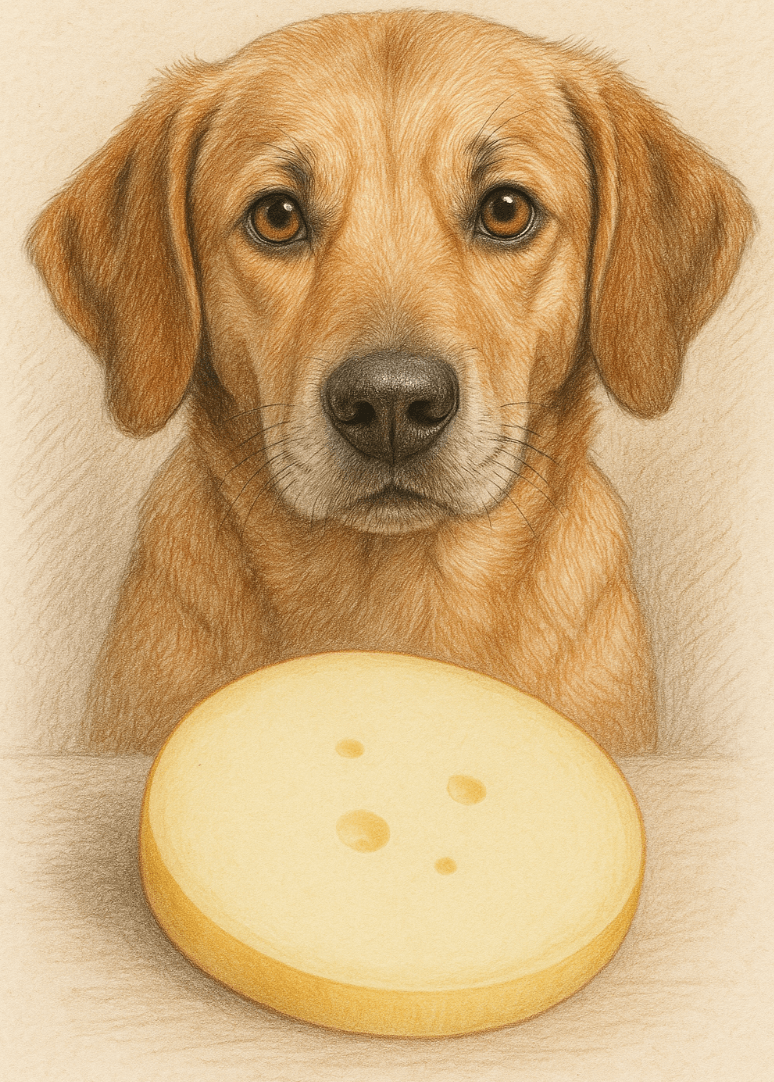Can Dogs Eat Provolone Cheese?
When it comes to sharing human food with our furry friends, pet owners often wonder what’s safe and what’s not. Provolone cheese, a semi-hard Italian cheese known for its rich flavor, is a popular snack for humans—but can dogs enjoy it too? While cheese can be an occasional treat for some dogs, certain factors must be considered before offering it to your pup. In this blog post, we’ll explore whether provolone cheese is safe for dogs, the potential benefits and risks, and how to introduce it into their diet responsibly. By understanding these guidelines, you can ensure your dog stays healthy while indulging in tasty treats.
Is Provolone Cheese Safe for Dogs?
Provolone cheese is generally safe for dogs in moderation, but there are important considerations to keep in mind. Understanding these factors will help you decide if it’s appropriate for your pet.
Low Toxicity:
Unlike foods like chocolate or onions, provolone cheese does not contain toxic ingredients that could harm your dog.Lactose Content:
Provolone cheese contains lactose, which many dogs struggle to digest. If your dog is lactose intolerant, it may cause digestive upset.High Fat Content:
This cheese is relatively high in fat, which can lead to weight gain or pancreatitis if consumed excessively.Sodium Levels:
Provolone cheese often contains added salt, which can be harmful to dogs in large amounts, especially those with kidney issues.Allergies or Sensitivities:
Some dogs may have allergies or sensitivities to dairy products, so it’s essential to monitor their reaction after consumption.
By keeping these points in mind, you can determine whether provolone cheese is a suitable treat for your dog.
Potential Benefits of Provolone Cheese for Dogs
While caution is necessary, provolone cheese can offer some benefits when given in small amounts as part of a balanced diet. Here’s how it might positively impact your dog’s health.
Rich in Protein:
Cheese contains protein, which supports muscle development and overall energy levels in active dogs.Calcium for Strong Bones:
The calcium content in provolone cheese contributes to maintaining strong bones and teeth.Great Training Treat:
Its savory flavor makes provolone cheese an excellent motivator during training sessions, especially for picky eaters.Source of Essential Vitamins:
Provolone cheese provides vitamins like B12, which aids in nerve function and red blood cell production.Easy to Portion Control:
Small cubes or slices allow you to manage portion sizes effectively, reducing the risk of overfeeding.
These benefits make provolone cheese a tempting option for occasional treats, provided it’s offered responsibly.
Check this guide 👉Can Dogs Eat Goat Cheese? Best 7 Expert Tips!
Check this guide 👉Can Dogs Eat Mozzarella Cheese? Best 7 Expert Tips!
Check this guide 👉Can Dogs Eat Blue Cheese? Best 7 Expert Tips!

Safe Ways to Feed Provolone Cheese | Risks of Feeding Too Much Provolone Cheese |
|---|---|
Offer small, bite-sized pieces | Risk of obesity due to high-fat content |
Use as a reward during training | Potential for digestive upset from lactose |
Ensure no added seasonings or spices | Sodium overload harming kidney health |
Monitor for allergic reactions | Pancreatitis caused by excessive fat intake |
Limit to occasional treats only | Long-term dietary imbalance |
How to Introduce Provolone Cheese to Your Dog’s Diet
If you decide to give your dog provolone cheese, it’s crucial to do so gradually and responsibly. Follow these steps to minimize risks and ensure a positive experience.
Start with Tiny Portions:
Begin with a very small piece (about the size of a pea) to assess how your dog reacts.Observe for Digestive Issues:
Watch for signs of vomiting, diarrhea, or gas, which may indicate lactose intolerance or other sensitivities.Avoid Flavored Varieties:
Stick to plain provolone cheese without added herbs, spices, or garlic, as these can be toxic to dogs.Incorporate Gradually:
Introduce cheese once every few weeks rather than making it a regular part of their diet.Consult Your Veterinarian:
Always seek professional advice before introducing new foods, especially if your dog has underlying health conditions.
These precautions will help you safely share this cheesy delight with your pup.
Signs Your Dog May Not Tolerate Provolone Cheese
Even if provolone cheese is generally safe, some dogs may not tolerate it well. Recognizing these warning signs ensures you act quickly to protect your dog’s health.
Vomiting or Diarrhea:
These symptoms suggest that your dog’s digestive system cannot handle the cheese.Excessive Gas:
Increased flatulence may indicate difficulty digesting lactose or fats in the cheese.Lethargy or Discomfort:
A sudden lack of energy or visible discomfort could signal an adverse reaction.Itchy Skin or Ear Infections:
Allergic reactions to dairy might manifest as skin irritation or recurring ear infections.Swelling or Hives:
Severe allergic responses require immediate veterinary attention to prevent complications.
Being vigilant about these signs allows you to adjust your dog’s diet accordingly and avoid future issues.
Common Mistakes to Avoid When Feeding Cheese
Even well-intentioned pet owners can make mistakes when introducing cheese to their dog’s diet. Avoiding these errors ensures your dog’s safety and well-being.
Overfeeding Cheese:
Too much cheese can lead to obesity, digestive issues, or nutrient imbalances. Always stick to small portions.Ignoring Ingredient Labels:
Many flavored cheeses contain additives like garlic or onion powder, which are toxic to dogs. Always check labels carefully.Assuming All Dogs Can Tolerate Dairy:
Not all dogs can digest lactose; assume your dog may need time to adjust or avoid dairy altogether.Making Cheese a Regular Treat:
Overusing cheese as a reward can disrupt your dog’s balanced diet and lead to health problems.Neglecting Veterinary Advice:
Skipping a vet consultation may result in unintentionally harming your dog, especially if they have pre-existing conditions.
Avoiding these pitfalls helps ensure responsible feeding practices.
Healthier Alternatives to Provolone Cheese
If provolone cheese isn’t ideal for your dog, there are plenty of healthier snacks that provide similar enjoyment without the risks.
Plain Cottage Cheese:
Lower in lactose and fat, cottage cheese is a gentler option for most dogs.Boiled Chicken Strips:
Lean, unseasoned chicken offers a protein-rich alternative that most dogs love.Carrot Sticks:
Crunchy carrots are low-calorie, fiber-rich, and perfect for chewing satisfaction.Pumpkin Puree:
Unsweetened pumpkin aids digestion and serves as a nutritious treat option.Blueberries:
These antioxidant-packed berries are sweet, safe, and packed with nutrients.
These alternatives provide variety and cater to different dietary needs.
Fun Ways to Incorporate Treats Like Provolone Cheese
Sharing treats with your dog doesn’t have to be boring—get creative while keeping health in mind. These ideas make snack time enjoyable and interactive.
Hide Treats in Puzzle Toys:
Stuff small pieces of provolone cheese inside puzzle toys to challenge your dog’s problem-solving skills.Use During Training Sessions:
Break cheese into tiny bits and use it as a high-value reward for mastering commands or tricks.Freeze for Summer Fun:
Freeze small cheese chunks in water or broth to create refreshing summer treats.Combine with Healthy Snacks:
Pair provolone cheese with fruits like blueberries or veggies like carrots for a balanced snack mix.Make Homemade Dog Biscuits:
Incorporate finely grated cheese into homemade biscuit recipes for a special homemade touch.
These fun ideas enhance your dog’s treat experience while maintaining nutritional balance.
Frequently Asked Questions About Feeding Provolone Cheese to Dogs
Can puppies eat provolone cheese?
Yes, but only in tiny amounts and under supervision, as their digestive systems are still developing.
What should I do if my dog eats too much provolone cheese?
Contact your veterinarian immediately to address any potential digestive or metabolic concerns.
Are other cheeses safer than provolone?
Low-lactose options like cottage cheese or mozzarella may be better alternatives for lactose-sensitive dogs.
How often can I feed my dog provolone cheese?
Limit it to once or twice a month as an occasional treat, not a daily snack.
Can dogs with pancreatitis eat provolone cheese?
No, dogs with pancreatitis should avoid high-fat foods like provolone cheese entirely.
Enjoying Provolone Cheese Responsibly with Your Dog
Feeding provolone cheese to your dog can be a delightful way to bond and reward them, but moderation and mindfulness are key. By understanding the potential risks and benefits, monitoring your dog’s reactions, and consulting your veterinarian, you can safely incorporate this treat into their diet. Remember, every dog is unique, and what works for one may not suit another. With proper care and attention, you can indulge your pup in a cheesy snack while prioritizing their health and happiness.
Do Cats Have Taste Buds? Best 7 Expert Tips! – Discover how cats experience flavors and why their taste is so unique.
Do Dogs Have Taste Buds? Best 7 Expert Tips! – Discover how dogs experience taste, their preferences, and what it means for their diet and health.
Can Cats Taste Sweet? Best 7 Expert Tips! – Discover why cats can’t taste sweetness, how it affects their diet, and tips to keep them healthy and happy.
Can Dogs Taste Sweet? Best 7 Expert Tips! – Discover how dogs perceive sweetness, which foods are safe, and tips to manage their sweet cravings responsibly.





